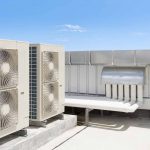 Make Sure Your Commercial Air Conditioning Is Summer Ready
Make Sure Your Commercial Air Conditioning Is Summer Ready
During this time of year, it’s vital that your commercial air conditioning is ready to keep your building cool and comfortable. To make sure your commercial AC is up to the challenge, there are a few things that you can do before the temperatures start to rise.
Check The Thermostat
In order to keep your energy bills down and your air conditioning working as efficiently as possible, you need to make sure that your thermostat is set at the right temperature. Your thermostat monitors the temperature of your home and determines whether it needs to turn on or off your air conditioner. To get the most accurate reading, your thermostat should be placed on an interior wall between 52 and 60 inches above the floor. The thermostat also needs to be positioned away from direct sunlight, drafts, doorways, and windows. These are all areas where the air naturally rises and sinks, so placing it in these locations can interfere with its ability to measure your house’s temperature accurately. You should always adjust your thermostat in one-degree increments to ensure that it’s setting at the most optimal temperature. This can help you save money and reduce your heating costs as well.
Check The Coolant Lines
Coolant hoses should be inspected at least twice a year, in the spring and fall. They should be free of cracks, rust, and frayed cords. If you see any of these symptoms, it’s a sign that it’s time to change your coolant hose. It’s also a good idea to check the hose clamps to ensure they are secure and free of leaks. If your coolant lines aren’t properly insulated, they can lose a significant amount of energy during the cooling process. They should be covered with insulating foam or tape to minimize this loss. This is an easy task that should only take a few minutes and can be done by you or by a professional AC repair service.
Check The Ductwork
One of the most important components of any commercial air conditioning system is its ductwork. Without it, your system can’t efficiently distribute conditioned air to every room in your building. As a result, your HVAC unit will have to work harder and consume more energy to compensate for the loss. This is a problem since it wastes money and also affects your air quality. This is because leaks in the ductwork can disturb hidden accumulations of dust and pull it into open areas of your home. This can cause dust allergies or worsen asthma symptoms. To check the ductwork, turn on your HVAC system and run your hand along any joints or connections to feel for leaking air. The easiest places to find leaks are duct joints where two air ducts meet.
Check The Filters
Your air conditioner has to work harder when it has a dirty filter. This causes it to draw more air into the system, which increases energy usage and reduces cooling efficiency. In addition, a dirty filter can attract airborne contaminants and pollen that affect indoor air quality. This can be particularly problematic in commercial buildings. A clean filter can reduce this risk by capturing these allergens. It can also help improve the airflow of your unit and keep the system running efficiently and effectively. Whether you use disposable paper filters or sturdy reusable ones, it’s important to change them on a regular basis. Many AC systems come with a filter access door in the return air duct next to the furnace or indoor unit. Others have a central filter grille installed in a wall or ceiling.
